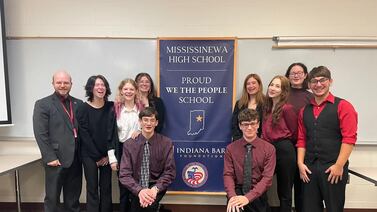Eight years ago, Chicago Public Schools launched a program that gave certain principals more control, such as more flexibility over budgets and being freed of extra oversight from district leaders. It was an effort to reward effective veteran school leaders with “more leadership and professional development opportunities.”
Now, a new study by a Northwestern University professor shows that the initiative — known as the Independent School Principals program, or ISP — resulted in better test scores and school climates and could be a cost-effective way to improve schools.
The analysis looked at 44 elementary schools that joined ISP between 2016 and 2018. Those schools saw pass rates for state reading and math tests grow, on average, by about 4 percentage points more than similar schools that weren’t part of ISP, according to the study. (Comparison schools were chosen based on things like demographics and test scores.)
The findings suggest that schools can benefit from more empowered principals, who are “closer to the ground” and may have a better sense than district leaders of what their students need, said C. Kirabo Jackson, an education and social policy professor at Northwestern who conducted the study.
But there are some caveats, Jackson said. The ISP schools with the best test score results were also run by principals who are considered “highly effective,” as determined by teacher ratings and other evaluations. Less effective principals saw test scores grow at a slower rate. Other studies have found mixed results when giving schools more autonomy, Jackson noted in his study.
The benefits of such a policy depend on “the capacity of the leaders to manage on their own,” said Jackson.
Test scores don’t show the full picture of how well students are doing, Jackson said, and his study found mixed results in other areas. For example, ISP schools on average had better ratings for school climate. But he found no evidence that these schools saw better student or teacher attendance.
The ISP initiative was launched under former Mayor Rahm Emanuel as part of an effort to pair principals with “more leadership and professional development opportunities,” according to the district.
Currently, district leaders identify veteran principals to apply for the program and then evaluate them based on several criteria, including their school’s test scores, their “five essentials” survey data and a series of interviews, according to the district.
A spokesperson did not respond in time for publication on whether there were minimum test scores that schools had to meet in order to be eligible.
Jackson noted that nearly all of the elementary schools he evaluated were highly rated by the state. In all, 86% of the city’s current 63 ISP schools — which also include middle and high schools and one early childhood education center — were rated either commendable or exemplary by the state, according to the most recently available Illinois Report Card information.
In addition to less oversight and more budget flexibility, ISP school leaders also have more power over professional learning for their staff and more flexibility over principal evaluations. In exchange, principals must meet several requirements, including maintaining or improving school performance, remaining compliant with district wide policies, and remaining as the school’s principal for at least two years.
Having more power over professional learning was among the biggest boons for Patricia Brekke, principal of Back of the Yards High School, who joined the ISP program in 2016. Her school, like others, used to spend time addressing student needs in ways that district leaders recommended.
While she considered those good strategies, her staff didn’t have extra time to focus on other issues they believed to be important, such as drilling down on students’ analytical and essay writing skills.
For the past seven years, she and other teachers have created their own professional development sessions to, in part, improve kids’ analytical skills. Her team draws on good examples from their own classrooms, including taking videos during the school day, so that teachers can see how their own colleagues are approaching instruction, Brekke said.
“I’ve got a lot of brilliant teachers, and their ideas really pushed me, I think, to be a better principal, you know?” Brekke said. “And it was really important for me to have them around the table and identify our problems of practice.”
Jackson only studied elementary schools, so he doesn’t know the program’s impact on high schools.
SAT scores at Brekke’s school were within five percentage points of the district’s. But Brekke said she’s noticed her students demonstrating “elevated” writing skills that go beyond a classic five-paragraph essay response.
“They’re really starting to think more deeply about text,” Brekke said.
Jackson found another bonus of the program: Principals “tend to remain in their schools” even after the two-year requirement. That is by design, said Jerry Travlos, a former ISP principal who now works as a district leader.
Travlos conducted a study, which Jackson cites, and found that ISP principals largely preferred the autonomy they got under the program. Extending more power to veteran principals is also a “retention strategy,” he said, at a time when school leaders are heading for the door.
Brekke, who has been an educator for 32 years, said she sometimes misses the camaraderie that comes along with a traditional network like most of Chicago’s public schools. But she loves being able to “geek out” and customize instruction for her students.
“Having those kinds of conversations are really just so refreshing and encouraging and motivating,” Brekke said. She paused and added, “Maybe it’s contributed to why I’m still here.”
Reema Amin is a reporter covering Chicago Public Schools. Contact Reema at ramin@chalkbeat.org.








